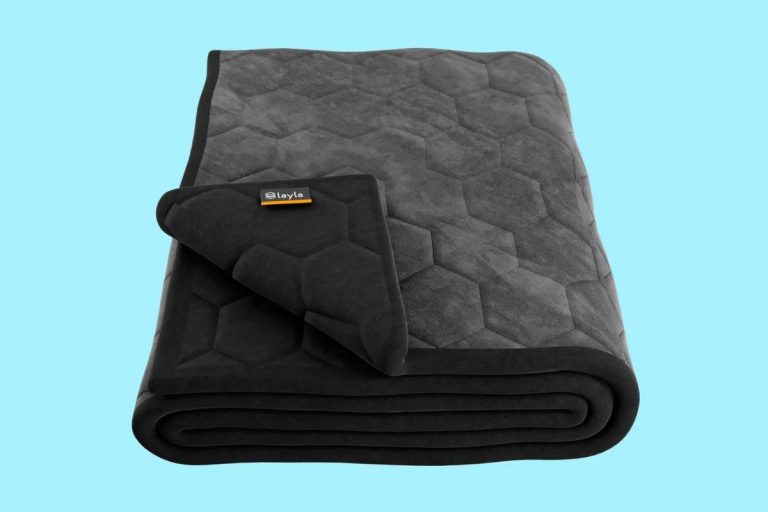Optimal health and wellbeing depend on the quality of sleep. Besides the duration of sleep, we also need to pay attention to where we sleep. Do you sleep on a bed or futon? Some people are more inclined to sleep on a bad and their mattress-related preferences vary. Others sleep on a sofa or a futon, options are endless here. If you are in a situation where you need to sleep on a futon for a while, or you’re considering doing so, you’re probably wondering what could happen. Is it okay to sleep on a futon every night or not? Read on to see the answer.
What is a futon?
Americans use the term futon to refer to a sofa that also serves as a guest bed. As futons are becoming more popular, many people choose them as primary beds. Many people use the terms futon and sofa bed interchangeably, although they’re not the same. You see, a sofa bed is hidden below the frame when used as a couch and comes with separate seat cushions. On the flip side, the mattress for a futon is used as both a seat cushion and the mattress.
In Japan, where futons come from, these pieces of furniture are slightly different than in the United States. Basically, futon is the Japanese traditional style of bedding. A futon consists of a mattress and duvet. The quilted sleeping pad, i.e. a futon, is usually stuffed with cotton or fiberfill and sits directly on the ground or on the tatami, wooden mat, or foam. In the U.S. futons aren’t directly on the floor. They are about as high as an average couch.
Can you sleep on a futon every night?
The true purpose of a futon is to serve as a mattress. In other words, a futon is supposed to be used as standard bedding. No evidence shows sleeping on a futon regularly would harm your health. As long as you have a comfortable futon that provides both cushioning and support, it’s okay to sleep on it every night.
Lack of comfort and support when sleeping could cause back pain, regardless of whether you’re sleeping on a bed or futon. We shouldn’t dismiss futons and assume they’re unsafe for sleeping every night just because the standard practice is to get a good night’s rest on the bed. As previously said, the absence of comfort and support can cause problems regardless of the bedding style.
To achieve optimal comfort, you can add another soft layer to your futon if necessary.
So, should I get a futon then?
As mentioned above, there is no evidence sleeping on a futon is harmful to you. The choice of whether to sleep on a futon regularly or not depends entirely on your preferences. Since sleep quality is vital for our health, you should choose a sleeping surface that you find the most comfortable and convenient. Always opt for a bedding style that gives you the best sleep and helps you feel relaxed and well-rested in the morning.
That being said, if you appreciate the space-saving benefits of the futon and want to buy one for sleeping regularly, then you need to be careful. You will benefit the most from an actual Japanese futon which tends to provide the perfect balance between hard and soft. Plus, you can fold it easily and put it away. This is particularly useful if you have a smaller bedroom or flat where bulky items would visually make the space even tinier. Actual Japanese futons tend to be more durable, as well. Western futons are nice for a while, but with prolonged use, they can mess up your back and neck. Even well-made and expensive Western futons lack the lumbar support meaning you constantly have to add foam or Tempur-pedic pillows for the head and also an additional pillow under the knees.
If you’re used to sleeping on a bed and replace it with a futon, you should be prepared for an adjustment period. Whenever we change the place where we sleep or a style of bedding, we need time to adjust and that’s perfectly natural.
Also Read:
5 Best Futon Mattress in 2021: Japanese Futon or American Futon?
Is futon equally good for everyone?
A futon is convenient for most people. This bedding style is particularly beneficial for back sleepers, people with sciatica, and men and women with poor blood circulation.
On the flip side, a futon may not be a good choice for people who need a high-profile bed to get in and out easily e.g. elderly, pregnant women, people with limited mobility, and some side sleepers. Getting up and down on the floor is not easy for everyone. Therefore, if you have problems with your joints or you have mobility issues due to other reasons, you may not find it easy to sleep on a futon.
Although not all side sleepers find futons uncomfortable, many experience shoulder pain and notice their hip and buttock region are sore after sleeping on a hard surface such as the floor all night. While this may be down to the poor choice of a futon, it’s still worth taking into consideration if you are a side sleeper as well.
Some stomach sleepers may also find it challenging to sleep on a futon every night. The culprit here is usually thin layering and the absence of support. To overcome this challenge you may want to opt for an extra firm futon but with a dose of comfort to prevent the unpleasant sensation when you turn to sleep on your stomach.
Overweight men and women may not find futons as comfortable. Futons, generally, are not able to provide that much support for excess weight so you may wake up feeling sore or with pain in your back and shoulders. Lighter men and women can benefit more from sleeping on a futon since they get to experience both comfort and support, especially if they are back sleepers. A high-quality futon can support the curvature of the spine, improve posture, and help alleviate your back pain.
Benefits of sleeping on a futon
Sleeping on a futon every night has a lot of benefits. We’re going to briefly address them below.
Back pain relief
Numbers show 80% of the population will experience back pain at some point in their lives. Almost 65 million Americans report a recent episode of back pain whereas 16 million (8%) of adults experience chronic back pain. A futon can help alleviate back pain. Its firmness provides both comfort and support to the spine and knees, thus helping relieve back pain.
Low risk of allergies
Most futon mattresses are made of cotton and are chemical-free, so the risk of experiencing an allergic reaction is low. On the flip side, a thick mattress such as a coil or memory foam can attract bacteria and fungus both of which cause allergic reactions.
Improved air circulation
Futon mattresses are made of natural materials that support air circulation. This allows you have a more refreshing sleep at night, especially if you live in tropical and humid areas.
Convenient for children
Using a genuine Japanese futon mattress reduces the risk of a child falling out of bed while asleep. This futon trait is particularly important for parents with active children. Even babies can benefit from a futon as they can crawl, roll, and explore their surroundings.
Easy maintenance
To keep your futon comfortable and clean you may want to vacuum it regularly using the upholstery attachment. Vacuuming helps remove dust and dirt from a futon mattress. Airing the futon out in the sun is the easiest way to maintain your genuine Japanese futon.
Futons are affordable
Inexpensiveness is a major reason people choose to sleep on a futon instead of an actual bed. Beds tend to be expensive and not everyone can afford them. Sometimes affordable beds can be uncomfortable and produce pain. That’s where futons step in. They are affordable and comfortable at the same time.
Are there any disadvantages?
Futons also have some shortcomings. For example, metal or wooden slats that hold the futon mattress up could be uncomfortable and cause, or contribute to, back pain.
Since it’s lighter than the actual bed, a futon can move easily. The ease of movement is useful when you’re trying to change its location in your home, but may not be convenient when you’re sleeping. To prevent the futon from moving every time someone gets in or out, you need to place it next to a wall or side corner of the room. Another option is to ensure the futon is placed on a carpet or a mat.
While a standard Japanese futon is useful for children, the American version of a futon is not. Active children love to jump on the bed, play, have fun and a futon may not be able to support all that action.
Additionally, a futon mattress is not as strong as a mattress on the bed. If you are a person who needs a great deal of support when sleeping, you may not get it from a futon. While futons provide the support it’s not at the same level as support from a thick mattress on the bed. If you have back or spine problems that require a lot of support, then a bed is a more practical option. The futon could be useful for daytime naps, for example.
Remember…
Genuine Japanese futons, such as shikibuton, are made of natural materials like cotton. If you decide to get this futon for sleeping every night, make sure to air it regularly. Cotton may absorb moisture and humidity is not good for it. Put your futon to the sun often to ensure it remains in perfect condition.
Conclusion
The futon is space-saving, comfortable, practical, and affordable. The benefits of futons, indeed, are numerous. Futons are okay for sleeping every night, but not for some people. The choice of whether to sleep on a futon regularly depends entirely on you. Always remember that the quality of your sleep on a futon depends on the choices you make when buying this piece of furniture. Before buying you need to take your needs, sleeping style, and preferences into consideration.





